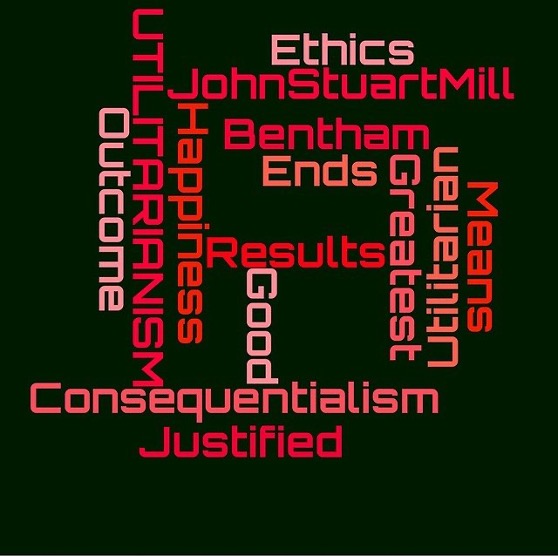Unit 9 Discovering the Ethical Theory of Consequentialism

Image by Craig Garner on Unsplash
Overview
In this unit, we will be looking at consequentialism. The Consequentialist says that the morally right thing to do is when the end result achieves your goal.
For instance, most people would agree that lying is wrong. But if telling a lie would help save a person’s life, consequentialism says it’s the right thing to do.
Consequentialism, then, says this:
- the ends (achieving the goal)
- justifies the means (do whatever you need to in order to achieve the goal)
In consequentialism, the end result can be described in different ways. For example, Disneyland is Disneyland, but each person describes the end result differently.
For instance, the best thing about Disneyland is:
- the rides?
- seeing Mickey and Minnie?
- the fireworks?
- seeing the shows?
Each of these examples is talking about the same place but each has a different perspective.
Consequentialism is consequentialism, but different philosophers see it from a different perspective.
Consequentialism is the best end result that:
- brings the most happiness. (Utilitarianism - John Stewart Mill; Jeremy Betham)
- is the best result for me. (Egotism - Harry Sidgwick)
- helps others. (Altruism - Auguste Comte)
- maximizes my pleasure. (Hedonism – Aristippus)
Topics
This unit is divided into the following topics:
- Does the ends justify the means?
- Types of consequentialism
- How do leaders apply consequentialism in decision making?
Learning Outcomes
When you have completed this unit, you should be able to:
- Define how the ends justifies the mean
- Analyze the different perspectives of consequentialism
- Understand how consequentialism impacts decision making
Activity Checklist
Here is a checklist of learning activities you will benefit from in completing this unit. You may find it useful for planning your work.
-
Activity 9.1: Read and respond to Bible
versus
-
Activity 9.2: Review the readings and videos of
Consequentialist Theories
-
Activity 9.3: Video Preparation and
presentation
-
Activity 9.4: Case study on Monetized
Utilitarianism: Ford Pinto
- Activity 9.5: Consequentialism Video - Part 2
Resources
Here are the resources you will need to complete this unit.
- Business ethics workshop: James Brusseau, Flat World Knowledge, LLC: Theories of Consequentialism
9.1 Does the means justify the ends?
Is it more important to have:
- A good outcome OR
- Simply do the right thing? OR
- It depends
Consider the following example:
Dad took son Jake to campus to help him move into the dorms. While walking around the campus, Dad was impressed with the new and exciting Rainier Hall dorm; he knew that was the dorm for Jake.
Jake and his Dad stood in line to get Jake’s dorm assignment. Jake was assigned to Striker Hall, the oldest dorm on campus. Dad then convinced the dorm-placement attendant that there was a mistake in Jake’s dorm assignment. When the dorm attendant disagreed, Dad informed him that he was a 1-million-dollar doner to the university. Jake’s dorm assignment changed to Rainier.
Dad achieved the end result he wanted. Would a consequentialist say that this end result is ethical? Why or why not?
Scenario:
Elliot and his team had been working long hours and now that their big project was done, Elliot hosted a celebration party. They got together to have some fun. However, Grace, the co-worker who no one liked, was not invited. She was hurt; the team felt bad.
The end goal was to have a celebration, but was it an ethical decision? Why or why not?
The theory of simply wanting a good outcome sounds easy, but is it? But should other factors be considered? (in this case, the co-worker’s feelings).
Learning Activities
Learning Activity 9.1: Read & Respond
Jesus practiced consequentialism regularly through His life by helping all kinds of people with all kinds of needs. He was not restricted by the norms and traditions of the day, nor did he allow the approval of others to take priority or dictate what He would do. He focused on the end result of helping people.
For this activity, read the verses listed from the Bible, or you can copy and paste the verse into Google to find and read the story.
Copy the table below into your Learning Journal. Provide a brief description of the end result that Jesus was aiming to achieve.
| Story | Bible Verse | Description of the end result important to Jesus |
|---|---|---|
| Woman at the well | John 4:4-26 | |
| Healing of the beggar | Luke 18:35-43 | |
| Welcoming children | Matthew 19:14 |
Note that the Learning Activities are ungraded, unless otherwise specified. They are designed to help you succeed in your assessments in this course, so you are strongly encouraged to complete them.
9.2 Types of Consequentialism

Image by rdaconnect from Pixabay
Utilitarianism - Seeking the greatest happiness

Image by Zac Durant on Unsplash
Egoism - Self Importance

Image by Fa Barboza on Unsplash
Altruism - Thinking of others before self

Image by Randalyn Hill on Unsplash
Hedonism - Maximizing pleasure

*Image by Taylor Wright on Unsplash
Activity 9.2: Consequentialist Theories Readings & Videos
In this activity, you will be learning about each of the consequentialist theories through suggested and self-directed reading and video training. This exercise will prepare you for the Activity 9.3 assignment.
Suggested Reading
-
Brusseau: Theories of Consequentialism
- Find on-line resource articles for each area of consequentialism
Suggested Video Trainings:
Watch: Consequentialism | Ethics Defined
Watch parts 1, 2, & 3 in the following videos:
Watch the first 4/29 minutes in the “Ethical Egoism Lecture”
Activity 9.3 - Consequentialism Video Preparation: Part 1
For this activity you are asked to prepare a video on Consequentialism describing the four perspectives for the purpose of sharing it with your Group, and be submitted in the dropbox as a link (*please note, Moodle video uploads may be limited by size). These videos (while ungraded) will be reviewed by the instructor.
Note for Facilitators: Facilitators will guide the group size and the group members. The goal will be that each of the four theories is assigned. Ideally, this would be one theory per group. If there are too few students in the class, assign more than one theory to a group.
-
Each group will choose one or two of the ethical theories as
directed by the Facilitator.
-
Work in groups of 2 – 3. The same video is presented/submitted by
each person in the group.
-
Class time may be used to begin research of this activity (Activity
9.2). Completing the research and recording the video recording will be
completed outside of class time.
- The presentation of the video will be done in the next class time.
The video will include the following:
Content
-
Briefly define each of the 4 types of consequentialism.
-
Utilitarianism
-
Egoism
-
Altruism
-
Hedonism
-
Utilitarianism
-
Identify an organization that demonstrates one of the types of
consequentialism.
-
Name the organization
-
How and why do you see it as demonstrating the type of
consequentialism
-
What is the purpose of the organization? What is the end result they
are seeking to achieve?
- Do you view it as a positive or a negative, or both? Why?
-
Name the organization
Criteria
-
5 – 7 minutes long
-
Your choice of what to present in your video. Some suggestions may
be:
-
PPT
-
Music
-
Voice recording
-
Planned-questions interview
-
Pictures
-
Movie clips
- Other ideas?
-
PPT
9.3 How do leaders apply consequentialism in decision making?

Image by Campaign Creators on Unsplash
As you have discovered, the ethical theory that is followed will influence the decision making process. Using consequentialism, the end result will always be the driving force in making a decision. But, which part of the consequentialist theory will be define the end result?
Activity 9.4: Ford Motor Company and Monetized Utilitarianism
💻: Take 5 minutes to read Monetized Utilitarianism: Ford Pinto (One person reads out loud as group members follow along.)
Next, discuss the following questions:
-
Define the difference between “Qualitative” and
“Quantitative”.
-
How did the Ford Motor Company implement a “Quantitative decision
making process?
-
Why did the Ford Motor Company decide not to fix the gas tank
issue?
-
What was their solution?
- In your opinion, what would have been a reasonable solution?
🧑🏽🤝🧑🏻: With your Group, can you identify a situation today where Monetized Utilitarianism is used. Is it a good thing or a bad thing?
Activity 9.5: Consequentialism Video: Part 2
For this activity, refer back to the Ethical Theory topic researched in Activities 9.2 and 9.3. Study the same ethical theory topic but from the angle of how it is applied to the decision-making processes an organization. This application will be broadly speaking.
Guidelines
- Follow the same guidelines as used in Activity 9.3
Content
-
Describe the organization. (As a guide, consider answering questions
such as who, what, where, when, and why).
-
As a brief example: A strip club will follow a Hedonistic ethic when
making decisions. The purpose of a strip club is to create opportunities
for patrons to have an experience that maximizes pleasure. This is done
by employing women to do pole dancing. Decisions related to this will be
to consider the location of the club, and the appearance of the girls
hired to dance. Bouncers will also work in the business to ensure the
safety of the dancers.
-
As a brief example: A strip club will follow a Hedonistic ethic when
making decisions. The purpose of a strip club is to create opportunities
for patrons to have an experience that maximizes pleasure. This is done
by employing women to do pole dancing. Decisions related to this will be
to consider the location of the club, and the appearance of the girls
hired to dance. Bouncers will also work in the business to ensure the
safety of the dancers.
-
When describing the business, answer the type of questions that
begin with: what, why, how, when, or who.
-
Describe how they would make a decision.
-
Describe how they would know if they are achieving the end result
intended.
-
Describe who would have input into the decision process
- Describe the stakeholders (such as owners, customers, board of directors, governing regulators)
Summary
In this unit, you learned about what the ethical theory of consequentialism is and how it impacts a decision making process. The ethical theory followed by an organization becomes the basis for values and decision style. For consequentialism, that is defined by measuring the best end result first and foremost.
Checking your Learning
Before you move on to the next unit, you may want to check to make sure that you are able to:
-
Define how the ends justifies the mean
-
Understand how Jesus practiced consequentialism
-
Analyze the different types of consequentialism
- Describe how different types of consequentialism impact decision making